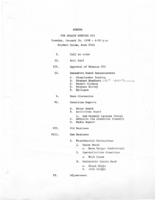Search the Special Collections and Archives Portal
Search Results

Julian Eusebio oral history interview: transcript
Date
Archival Collection
Description
Oral history interview with Julian Eusebio conducted by Cecilia Winchell, Jerwin Tiu, and Stefani Evans on June 01, 2022 for the Reflections: the Las Vegas Asian American and Pacific Islander Oral History Project. In this interview, Eusebio discusses his childhood in the Philippines countryside, helping his parents farm and harvest rice. After moving to Manila for college, Eusebio studied architecture and illustrated for comics and magazines. After moving to Los Angeles, California, Eusebio started a construction business, doing landscapes and constructing swimming pools for celebrities such as Michael Jackson. In 1992, he opened another branch in Las Vegas, Nevada. After retiring in 2010, Eusebio took up painting again and cites his favorite artists as Norman Rockwell and Rembrandt. In the remainder of the interview, he discusses his drawing process and how he started showing his artwork throughout the Las Vegas Clark County Library District.
Text

Catherine Abrigo oral history interview: transcript
Date
Archival Collection
Description
Oral history interview with Cathrine Abrigo conducted by Cecilia Winchell and Stefani Evans on July 20, 2022 for the Reflections: the Las Vegas Asian American and Pacific Islander Oral History Project. In this interview, Abrigo describes her early life in the Philippines, where she attended Catholic school and briefly studied medical technology in college. She describes immigrating to Las Vegas, Nevada with her husband and the difficulty of leaving her immediate family behind. She discusses working for the Cosmopolitan in 2011 and becoming deeply involved with the Culinary Workers Union Local 226. Throughout the interview, Abrigo talks about religion, food, and her activism with the Culinary Union.
Text

Meeting minutes for Consolidated Student Senate, University of Nevada, Las Vegas, January 24, 1978
Date
Archival Collection
Description
Text

Interview with Stephen Craig Ronshaugen, November 26, 2004
Date
Archival Collection
Description
Text

Interview with Native American Forum on Nuclear Issues, April 10, 2008
Date
Archival Collection
Description
Text

Interview with Bruce Walter Church, April 27, 2004
Date
Archival Collection
Description
Access note: May not quote in any form without written permission from interviewee
Text

Interview with Harold David Cunningham, March 11, 2004
Date
Archival Collection
Description
Text

Denise Lutey oral history interview: transcript
Date
Archival Collection
Description
Oral history interview with Denise Lutey conducted by Barbara Tabach on February 27, 2018 for the Remembering 1 October Oral History Project. In this interview, University of Las Vegas, Nevada (UNLV) campus officer Denise Lutey gives an account on the night of the October 1, 2017 mass shooting in Las Vegas, Nevada. She discusses the campus security measures taken at UNLV in order to keep the campus secure and create a safe space for any survivors. She mentions the people who were involved in providing safety and resources for the survivors, including the officers and student workers. Officer Lutey also discusses the general campus response as well as the various resources offered to citizens to help them be prepared for an emergency situation, such as the Active Shooter Training provided on campus.
Text

Magdalena Martinez oral history interview: transcript
Date
Archival Collection
Description
Oral history interview with Magdalena Martinez conducted by Monserrath Hernandez and Barbara Tabach on April 4, 2019 for the Latinx Voices of Southern Nevada Oral History Project. In this interview, Magdalena Martinez recalls her childhood and growing up in Los Angeles, California. Martinez's parents are from Durango, Mexico, and immigrated to the United States in the 1970s. Martinez describes the generational differences that the women in her family faced and how the feminist movement of the 1970s did not resonate with women of color. Her family moved to Las Vegas in 1986 where she attended Bishop Gorman High School. After transferring to the University of Nevada, Las Vegas (UNLV) from community college and joining a student organization that would later become Student Organization of Latinxs, she became an early member of the Latino Youth Leadership Conference (LYLC) sponsored by the Latin Chamber of Commerce. Martinez describes how the LYLC has evolved over the years, and talks about her role in those changes. She discusses past work for CSN, NSHE, and currently is the Director of Education Programs with the Lincy Institute.
Text

Jay Pleggenkuhle and Daniel Perez oral history interview: transcript
Date
Archival Collection
Description
Oral history interview with Jay Pleggenkuhle and Daniel Perez conducted by Claytee D. White on July 18, 2018 for the Remembering 1 October Oral History Project. In this interview, Jay and Daniel describe their business partnership in a landscaping venture. After the tragic event on October 1, 2017, the pair wanted to do something for the city of Las Vegas, Nevada. Perez suggested that Pleggenkuhle call officials at the City of Las Vegas and propose a healing garden. The City offered a site and the work began, and within 72 hours, a design materialized, volunteers appeared, materials arrived, and the work began. On Friday, the official dedication was held. Pleggenkuhle and Perez share stories of the garden's construction, the generosity of the human spirit, love, and giving back as a city mourns. The two recall that the main oak tree, the Tree of Life, centers the garden and the 58 smaller trees anchor the garden.
Text
